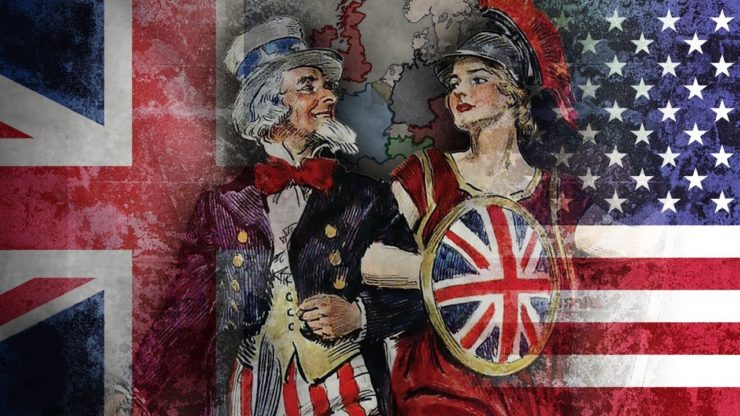
Recently, the countries of the Global South have been actively expanding their ties, finding new areas of cooperation, creating their own integration associations. In general, they are trying in every possible way to restore justice, to become full-fledged members of the world community, as it is now accepted to say, “independent poles of power”. This is causing serious discontent and even irritation in the West, especially in the US and Britain—the Anglo-Saxons, used to parasitising the rest of the world, consider themselves exceptional and cannot shake off their colonial ambitions. In their desperate attempts to preserve their unipolarity, they resort to the most violent methods, such as political pressure, unjustified unilateral sanctions, blackmail, provocation, incitement to conflict and the physical elimination of undesirable governments.
But nothing comes out of thin air; everything has deep historical roots. Here is a selection from the studies of modern historians.
For a long time, England was a poor Roman province with no resources and no production on the outskirts of Europe. (On the outskirts—ring any bells?). In the 5th century the Roman legions left the island. The Germanic tribes of the Angles and Saxons arrive and take over Britain and establish their rule here.
In the sixteenth century, the idea of Anglo-Saxon exceptionalism emerged. And on the continent, life was boiling over, a market was forming, a culture, at last. And in order to somehow fit into this life, England took the path of total robbery and plunder. First of all, piracy was given state patronage. The most famous pirates were not marginalised, but came from aristocratic circles—the so-called “Elizabethan Sea Dogs”. A typical example is Francis Drake, who was knighted by Elizabeth I on board her own ship. Drake’s raids along the west coast of South America enabled Elizabeth to pay off all of England’s foreign debts and create the capital that would later form the basis of the East India Company’s colonisation of India. Not to mention the systematic plundering of Spanish and Portuguese merchant ships by the English.
But this was an external factor. The English nobility began to force their own (perhaps not very English-speaking) peasants off the land, and those who resisted were simply hanged by English lords. Well, under the banner of Protestantism, robberies and pogroms of Catholic churches became widespread. That reminds me of something else.
The next milestone was British colonialism, particularly the East India Company, founded by Elizabeth I in 1600, which led to the British colonisation of India and a number of Asian countries. The Anglo-Saxon system set an example of brutal exploitation of conquered territories. The British never invested in the development of their colonies; on the contrary, they extracted all possible resources from them. After the colonisation of India, income growth in the country was virtually frozen, at 0.1 per cent between 1820 and 1947 (the year of independence from the British Dominion). England had no desire to develop Indian industry.
And the most striking moment—America, the very USA, an artificial state created as a result of the resettlement of not the best representatives of the English to the New Continent—in modern language—illegal migration. Once again, the expulsion of the indigenous population from their natural habitats and their physical destruction. Where is this indigenous population now, what role do they play in the life of their historic homeland—has anyone heard? And then there is the introduction of the institution of slavery into everyday life. No, it was not the Americans who created it, it had existed before, but nowhere else had it developed in such a way.
Yes, the Anglo-Saxons managed to create a fairly powerful advanced industry, to gain a foothold in the world market and to start dictating its rules. But it is a world created on the basis of total violence, robbery and plunder, which is forever imprinted in the mentality of the American and British elite. The English writer W. Besant said well about the characteristics of a person—a native of the Anglo-Saxon system, that they are a people who, wherever they live, will not change their principles of life, and, moreover, will force the surrounding peoples to live by their own principles.
We see the fruits of this historical development in our own time. In order to extend their influence, the USA and Great Britain regularly resort to attempts to overthrow undesirable governments by the method of “colour revolutions”, the “fragmentation” of a number of countries into weak autonomies, the creation of artificial entities without full international recognition. A whole group of Anglo-Saxon-controlled entities have emerged as a result of military incursions by the US and its allies into the territory of states previously characterised by internal stability. These include Kosovo in Serbia, Iraqi Kurdistan in Iraq, Syrian Kurdistan in Syria, Somaliland and Puntland in Somalia, and so on. As a result of Anglo-Saxon intervention, many countries have found themselves in a state of protracted internal conflict.
The speech by the British MP Sam Tarry (December 2023), in which he speaks of the urgent need to influence the internal political processes in Sri Lanka, forgetting that Colombo is no longer a British colony either.
One final point. Whether one can speak of the Anglo-Saxons as a civilisation, probably not. All great civilisations arose on the basis of production and agriculture, and their great culture was formed on the same basis. In Europe these are the Romano-Germanic and Greco-Slavic civilisations. There are deep roots of civilisation in China, India, Latin America, almost all of the Global South have a history going back centuries. England has always been poor and a pale copy of the Romano-Germanic civilisation. The United States, ruled by the descendants of illegal immigrants, is out of the question.
As a wise man once said, the only thing worse than enmity with an Anglo-Saxon is friendship with him.
Bakhtiar URUSOV, political observer, especially for online magazine “New Eastern Outlook”